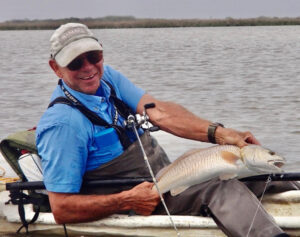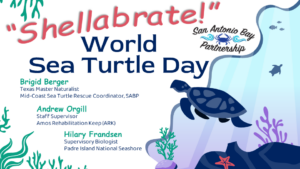“Shellabrate” World Sea Turtle Day
Thursday, June 13, 2024
Click here for the Recorded Webinar on YouTube
Beyond their adorable looks and iconic status, sea turtles are keystone species crucial for balancing marine ecosystems. Texas is home to two of the world’s seven species. Juvenile Green Sea Turtles spend their childhood in our shallow bays while female Kemp’s Ridley Sea Turtle utilize our beaches to lay eggs.
In “Shellabration” of World Sea Turtle Day, join us to learn more about our beloved Texas Sea Turtles from local leaders in sea turtle rescue, rehab and protection. Brigid Berger, SABP’s Sea Turtle Rescue Coordinator helps us understand the unique characteristics of our Texas Turtles and how SABP volunteers are helping to protect and rescue these beloved animals. Andrew Orgill, Staff Supervisor and Certified Wildlife Rehabilitator at the Amos Rehabilitation Keep in Port Aransas explains the unique care and treatment turtles receive during their rehab process. Hilary Frandsen, Supervising Biologist, Padre Island National Seashore provides a State of the Texas Turtle address.
Tackling Texas’ Trash Problem
Thursday, May 2, 2024
Did you know Texas has more coastal and marine debris per mile than any other U.S. state? Some of this trash comes from other states and even from other countries, but a good amount of garbage is just plain local. This garbage accumulates when people leave trash directly on beaches, but the trash can also travel via storm drains, canals, or rivers to the coast. Trash also arises when boaters bring plastic on board, along with fishing lines, and dispose of it overboard intentionally or have it accidentally fly off. Wind can even blow trash from landfills and other areas into the water. Marine debris has negative impacts on the economy, recreation, and tourism. Visitors and locals want clean, safe, debris-free beaches and waterways. Texans who catch or consume commercially important species, such as blue crabs, sea trout, flounder, and red and black drum, are impacted as these species are often needlessly killed “via “ghost fishing” as they get entangled in plastics, abandoned crab traps and fishing nets and lines. Boaters can also accidentally hit trash, get a fishing line or net tangled in a propeller, or have a plastic bag block their motor’s water, ruining their outing. The most visible impacts of plastic debris on the environment are the ingestion, suffocation, and entanglement of hundreds of marine species. Wildlife, including seabirds, whales, crabs, fish, and turtles, mistake plastic waste for food and then die as their stomachs become filled with garbage instead of food. Yet, the toxicological threats from ingesting contaminants that seep from debris, especially plastics, threaten marine life and those who want to enjoy seafood.
Jace Tunnell, M.S., Harte Research Institute

Jace Tunnell is is the HRI Director of Community Engagement at the Harte Research Institute for Gulf of Mexico Studies at Texas A&M University-Corpus Christi. Jace is the founder of a citizen science project called Nurdle Patrol that tracks plastic pellet concentrations internationally to create awareness of plastics in the ocean and develop new policy based on the data. He also directs and produces a video series called “Beachcombing” about items washing up along the Gulf of Mexico beaches to help promote awareness on Gulf processes and interesting creatures in the ocean. His conservation efforts include educating the public about plastic pollution, marine science, and protection of our natural resources. Jace received a Master’s degree in Marine Biology from Texas A&M University-Corpus Christi in 2001.
Allan R. Berger, San Antonio Bay Partnership

Allan Berger is the Chairman of San Antonio Bay Partnership and plays a leading role in designing as well as implementing many of SABP’s programs including the Coastal Clean-up program. Allan grew up in Port O’Connor and is a graduate of Calhoun High School in Port Lavaca. He has a BS in Chemical Engineering from Texas A&M University—and retired from ExxonMobil after 35 years in various assignments. Allan and his wife, Brigid, retired to Port O’Connor in 2013. Allan is an avid fisherman who also enjoys paddling, hiking, and the great outdoors and wants to preserve it for his five grandkids. When not fishing, Allan is active in other conservation causes as a Texas Master Naturalist, a member of Calhoun County Parks Board, and previously on the Board of the Gulf Coast Bird Observatory.
